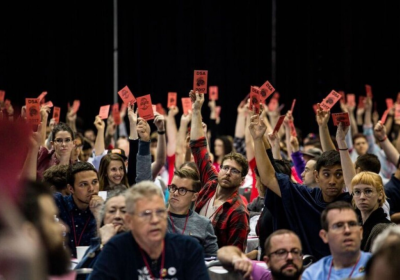Two articles and a video presentation looking at Russia's two revolutions in 1917, Marx and Engels on ecology and Lukacs' views on alienation and class consciousness
Socialism
In his response to my August 1 (GLW #1148) piece on the strategy of US Senator Bernie Sanders, Danny Fairfax writes in GLW #1150 on why he thinks the Democratic Party can be reformed.
One error the comrade makes is his view of the primary system in the United States. He thinks it gives roughly the same chances for “grassroots movements to defeat entrenched [Democratic] party elites” as the structure of the Labour Party in Britain allowed Jeremy Corbyn’s rise to the leadership. It doesn’t.
Leafing through my August 1 copy of Green Left Weekly, I thought I spotted an egregious typo. Surely, Barry Sheppard’s dispatch from San Francisco, “Bernie Sanders’ Democratic Party strategy fatally flawed” in issue 1148 had had an apostrophe inserted in the headline where there should have been a colon.
The Democratic Socialists of America (DSA) held their national conference in Chicago on August 5 and 6, at a gathering that confirmed its emergence as stronger, younger and more radical group than it has ever been.
Before last year’s US presidential election, the DSA boasted between 7000-8000 members. Since then, it has ballooned to 25,000 members — mostly young and hungry for a fight.
Stalin Perez Borges is an activist with LUCHAS (United League of Chavista Socialists) and a member of the Consultative Council of the Bolivarian Socialist Workers’ Central (CBST).
He spoke to Green Left Weekly’s Federico Fuentes about the July 30 elections for the National Constituent Assembly (ANC) and its subsequent inauguration, as well as the August 6 armed assault on a military base by right-wing opponents of Venezuela’s socialist government.
Quim Arrufat is a joint national spokesperson for the People’s Unity List (CUP), an organisation that he has likened to “urban Zapatistas” – in reference to the insurgent indigenous movement based in Chiapas, Mexico – that is committed to Catalan independence and socialism.
One hundred years ago in the aftermath of defeat of the July 16-20 [3-7 in New Style] protest movement by workers and soldiers, the Bolsheviks responded to the “July Days” setback by calling on the people to ignore provocations and expose rightist slander.
The wave of protests was repelled by military and police attacks, with hundreds of casualties, on the orders of the Provisional Government — the capitalist government that came to power after the February Revolution overthrew the Tsar and which was supported by the moderate socialists.
It was a key phase in the storm that swept Russia during 1917. This storm culminated in the October Revolution when, led by the Bolsheviks, the soviets (councils) of workers, soldiers and peasants took power, overthrowing the Provisional Government.
“The general idea of this little book is to understand and explain why Marx will still be read in the twenty-first century, not only as a monument of the past, but as a contemporary author — contemporary both because of the questions he poses for philosophy and because of the concepts he offers it,” French philosopher Etienne Balibar writes in The Philosophy of Marx.
With some reservations, I feel he achieves this goal. It is a thought-provoking book, but it may disappoint readers who seek either an introduction to Marx’s philosophy or a straightforward account of how Marx’s ideas can inspire focused political action in the 21st century.
After weeks of imperialist threats and opposition violence, the elections for Venezuela's National Constituent Assembly (ANC) took place on July 30. The result was a huge turnout of more than 8 million voters, around 41% of the electorate, which gave Chavismo a much-needed shot in the arm.
In a New York Times op-ed in June titled “How Democrats Can Stop Losing”, Bernie Sanders slammed the Democratic Party.
“In 2016 the Democratic Party lost the presidency to possibly the least popular candidate in American history,” he wrote. “In recent years, Democrats have also lost the Senate and House to right-wing Republicans whose extremist agenda is far removed from where most Americans are politically.
One hundred years ago, between July 16-20 [3-7 in New Style] 1917, a protest movement of workers and soldiers in Petrograd was repelled by military and police attacks, with hundreds of casualties.
It was a key phase in the storm that swept Russia during 1917. It culminated in the October Revolution when, led by the Bolsheviks, the soviets (councils) of workers, soldiers and peasants took power, overthrowing the capitalist Provisional Government that was formed after the February Revolution deposed the Tsar.
Check out some of the latest articles from Links International Journal of Socialist Renewal.
The relevance of October 1917: A discussion with China Miéville
- Previous page
- Page 19
- Next page











